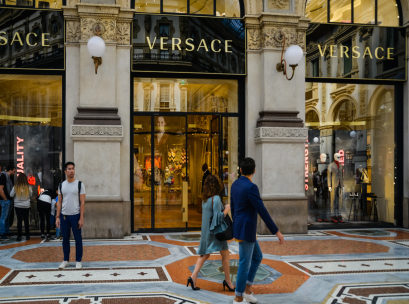VersaceVersace
Michael Kors buys up Versace
US fashion company Michael Kors has acquired the Italian luxury brand Versace for US$2.12 billion ($2.92 billion). When the deal closes, Michael Kors Holdings will change its name to Capri Holdings Limited.
Investment from Michael Kors, a brand known for its accessibility, seems to bode well. Its capital injections helped luxury shoe brand Jimmy Choo, acquired last year, to lift revenues by 26.3 per cent in the three months to the end of June to US$1.2 billion ($1.65 billion), compared with the same period in 2017, The Guardian reports.
John D. Idol, Michael Kors Holdings chair and CEO, said his company was committed to investing in the development of the Versace brand, increasing the number of Versace outlets from 200 to 300 stores and accelerating its e-commerce and omnichannel development.
Donatella Versace, who has been running Versace since the death of her brother in 1997, will stay on as creative director, a development which pleased commentators. She and her brother Santo and daughter Allegra will receive more than US$170 million ($234.4 million) worth of shares in the newly united company.
Esprit posts $448m loss, tips sales declines
Struggling fashion label Esprit is looking to new leadership to turn the business around after a horror year in which it ceased operations in Australia and New Zealand.
The Hong Kong-listed company posted a loss of $448.48 million for the year to June 30, in line with a profit warning issued early last month.
The result included a raft of write-downs, including costs of exiting the Australia and New Zealand markets, cancelling leases for non-performing stores and many other one-offs.
With widespread store closures, total group revenue fell 11.1 per cent to $271 million, yet overheads were trimmed just 3.3 per cent, widening the operating loss.
New executive chairman Dr Raymond Or Ching Fai said in a stock exchange filing the sales decline was higher than expected with falling traffic at both online and offline stores.
New group CEO Anders Kristiansen, who took the helm on June 1, says he plans to “sharpen the brand identity, create an inspiring omnichannel shopping experience for our customers, and launch stylish and geographically adapted collections”.
However the company has warned shareholders it is not yet
out of the woods, tipping a further drop in sales for the current
financial year in the “low double-digit percentage” range year
on year.
Amazon opens bricks-and-mortar in Manhattan
Amazon has taken another leap into bricks-and-mortar shopping
with a new store in New York’s trendy SoHo neighbourhood that
carries toys, household goods and a range of other products that
are popular on its website.
The shop, known as Amazon 4-star, will let customers play with
Echo speakers, Kindle e-readers and other devices made by the
company. It will also sell books, games, kitchenware and other
items that its masses of customer data tell it would be popular
with New Yorkers.
Amazon is offering special deals for members of its loyalty
program, Prime. Digital price tags alongside every product show the
Prime price and list price, as well as Prime member savings, average
star rating, and the total number of reviews a product has received.
Customers who aren’t already Prime members can sign up on
the spot.
Amazon currently has a handful of bricks-and-mortar bookstores
across the US and is starting to open more of its cashier-less
convenience stores known as Amazon Go.
US and China escalate trade war
The United States has imposed new tariffs on US$200 billion ($276.7
billion) worth of Chinese goods and Beijing has retaliated with tariffs
on US$60 billion ($83 billion) worth of US products, the
latest salvos in the ongoing trade war between the world’s two
largest economies.
Chinese products hit with new duties include a range of consumer
goods from vacuum cleaners to seafood to internet-connected
devices. US goods targeted by Beijing include liquefied natural gas
and certain types of aircraft.
The two nations earlier this year imposed tariffs on some US$50
billion ($69.2 billion) worth of goods, including industrial materials
and components.
In response to the new tariffs, China issued a 36,000-word white
paper accusing the US of “economic hegemony” that threatens the
global multilateral trading system as well as Sino-US ties, state news
agency Xinhua reports.
The Guardian reports that White House officials say they look
towards a “positive way forward” with China, but no date has been
set for talks and neither side seems eager to compromise.
Economists fear that a protracted dispute will eventually stunt
growth not just in the US and China but across the broader
global economy.






